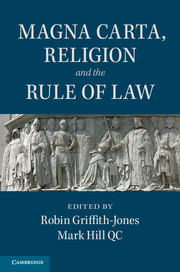Book contents
- Frontmatter
- Contents
- List of contributors
- Preface and acknowledgments
- I Introduction
- II The birth of Magna Carta and the spread of its principles
- 3 Due process in Magna Carta: its sources in English law, canon law and Stephen Langton
- 4 From Charter to common law: the rights and liberties of the pre-Reformation Church
- 5 Magna Carta and the law of nations
- 6 Magna Carta and personal liberty
- 7 Towards a new Magna Carta for early modern England
- 8 Differences over the foundation of law in seventeenth- and eighteenth-century America
- III Comparative religious approaches to Magna Carta's rule of law
- IV The contemporary inheritance of Magna Carta
- Appendix The Charters in translation
- Bibliography
- Index
3 - Due process in Magna Carta: its sources in English law, canon law and Stephen Langton
from II - The birth of Magna Carta and the spread of its principles
Published online by Cambridge University Press: 05 May 2015
- Frontmatter
- Contents
- List of contributors
- Preface and acknowledgments
- I Introduction
- II The birth of Magna Carta and the spread of its principles
- 3 Due process in Magna Carta: its sources in English law, canon law and Stephen Langton
- 4 From Charter to common law: the rights and liberties of the pre-Reformation Church
- 5 Magna Carta and the law of nations
- 6 Magna Carta and personal liberty
- 7 Towards a new Magna Carta for early modern England
- 8 Differences over the foundation of law in seventeenth- and eighteenth-century America
- III Comparative religious approaches to Magna Carta's rule of law
- IV The contemporary inheritance of Magna Carta
- Appendix The Charters in translation
- Bibliography
- Index
Summary
Of the sixty-two provisions in the Magna Carta of 1215 only four have survived on the statute books today. One of these is the celebrated article 39 with its sibling article 52, which have become the fount of inspiration for the doctrine of due process that has received great attention in Anglo-American law. In this chapter, however, I shall leave to the expertise of the lawyers the subsequent development of due process downstream from Magna Carta where it evolved into trial by jury. As a medieval historian I shall limit myself to exploring its sources upstream chiefly in three streams, flowing from English law, canon law and the personal contributions of Archbishop Stephen Langton. This exploration contains little that will surprise experts familiar with the subject but will serve my particular purpose to highlight the contributions of Langton. Article 39 of Magna Carta states:
No free man (nullus liber homo) shall be taken or imprisoned or disseised or outlawed or exiled or in any way ruined, nor will we go or send against him, except by the lawful judgement of his peers or by the law of the land (nisi per legale judicium parium suorum vel per legem terre).
Article 52 applies the principle to the immediate situation:
If anyone has been disseised or deprived by us without lawful judgment of his peers (sine legali judicio parium suorum) of lands castles, liberties or his rights we will restore them to him at once …
The article then proceeds to apply the remedy to the disseisins of Kings Henry II and Richard as well and to entrust its ultimate enforcement to the judgment of the twenty-five barons as instituted by the barons in Magna Carta (article 61).
Due process may be defined as ‘the course of legal proceedings established by the legal system … to protect individual rights’. As defined here, the principle of due process is, in fact, a commonplace in jurisprudence, perhaps even a tautology, that is, the confusion of cause and effect.
- Type
- Chapter
- Information
- Magna Carta, Religion and the Rule of Law , pp. 31 - 52Publisher: Cambridge University PressPrint publication year: 2015



